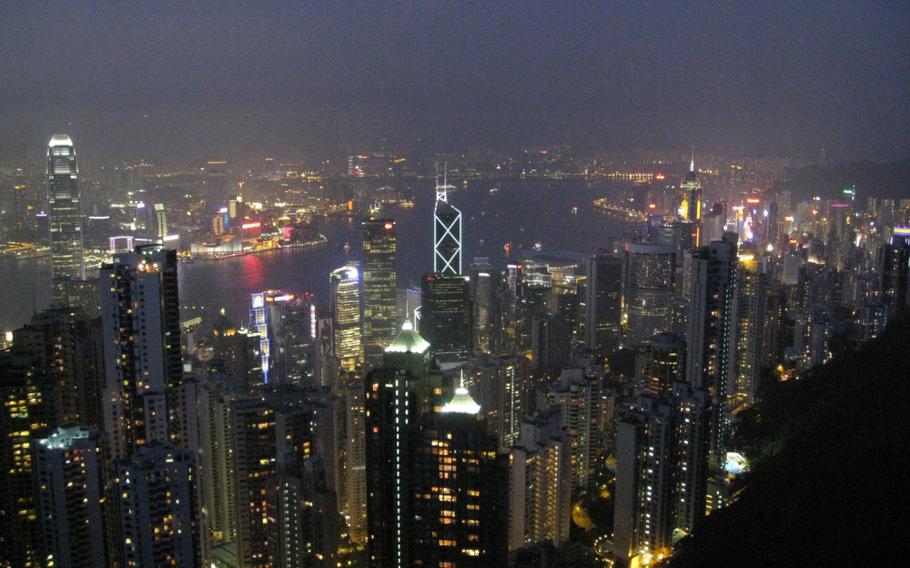HONG KONG — Holding umbrellas to shield themselves against a summer rain, supporters steadily streamed into the area around the dated green-and-white complex that houses the Apple Daily newsroom.
Some just looked up, staring at the building. Others laid flowers, their children in tow. One posted a message of support on the gates, covered in plastic so the paper would not get soggy.
And then at 11:59 p.m., the pro-democracy newspaper — which for 26 years has been a fearless critic of the Chinese Communist Party and a staunch supporter of Hong Kong’s democracy movement — ceased operations.
The forced closure of Apple Daily, after the arrest of its founder, top executives and a government asset seizure, is the starkest example yet of the seismic changes underway in Hong Kong, the once-autonomous Chinese territory. Bedrocks of the city — the right to assembly, to a free press, to one’s opinion — have crumbled swiftly in the months since Beijing passed a national security law designed to remake Hong Kong in its image.
Removing a critical newspaper from circulation and arresting several of its journalists, many in Hong Kong believe, shows Beijing’s determination to not just silence opponents but entirely erase the territory’s long history of defiance, dissent and critical thinking. With street demonstrations quashed, elections postponed and electoral rules changed, the simple act of reading Apple Daily was one of the last remaining forms of free expression in Hong Kong.
“In all of Hong Kong, only this newspaper represents our voices and our truth,” said a 25-year-old who was among those gathered outside, who spoke on the condition that only her last name, Chik, be used, for fear of reprisal. “It is pathetic to see Hong Kong end up like this.”
Last week, police raided the newspaper’s offices for the second time in a year, arresting five executives, including three of Apple Daily’s top editors. The operation, which involved 500 officers, was the first time police explicitly targeted Apple Daily’s news operations, confiscating boxes full of journalistic materials and searching reporters’ computers. On Wednesday, police arrested a 55-year-old opinion writer for the paper who writes under the pseudonym Li Ping, the first time it has targeted a writer.
All have been arrested under the national security law for the broadly worded crime of conspiring to collude with foreign forces, one of four offenses under the law punishable by life in prison.
The Hong Kong government also froze Apple Daily’s assets and ordered banks to stop processing payments to staff or vendors. Under the weight of the asset seizure — and citing fears that its reporters could continue to be arrested — Next Digital, Apple Daily’s publisher, announced Wednesday that it would cease operations this week, with its last print edition Thursday.
The newspaper’s founder, 73-year-old media tycoon Jimmy Lai, has been a constant target of the Chinese Communist Party, which has branded him a “riot leader,” “secessionist” and “traitor.” Lai was among the first to be arrested under the security law and has also been charged for his role in other pro-democracy protests, including some that were peaceful. Lai, who has been detained since December, built his fortune in the garment industry before founding Apple Daily and Next Digital.
At the time of its closure, Apple Daily had 600,000 paying subscribers — the largest independent media outlet in Hong Kong — and assets that would have allowed it to print for at least 18 more months. About 1,000 people will be affected by the closure, said Mark Simon, an adviser to Lai, adding that he was “hopeful” they could continue publication elsewhere.
The government’s decision to target the entire newspaper and its operations has been widely condemned by human rights groups and Western governments. Sophie Richardson, China director at Human Rights Watch, said that “forcing Apple Daily to shutter lays bare Hong Kong people’s dwindling access to accurate information and the growing restrictions on their basic rights.”
British Foreign Secretary Dominic Raab said the forced closure of Apple Daily is a “chilling demonstration of [Hong Kong authorities’] campaign to silence all opposition voices.”
“It is clearer than ever that the national security law is being used to curtail freedom and punish dissent,” he said.
The Hong Kong government has insisted that the actions are not about freedom of the press or free speech, and has accused those arrested of a “conspiracy” in which they pushed for Western sanctions against China and Hong Kong.
One Apple Daily reporter, who spoke on the condition of anonymity for fear of reprisal, said the newsroom has been defined by loss: of its staff, many of whom have quit, and of materials painstakingly gathered over the years. The shredder, he said, is constantly occupied, while the rubbish bins are full of mementos, notes and documents.
“It is regrettable to see it end like this,” said the reporter, a six-year veteran of the newspaper. “Some colleagues have been coming to the office with red, puffy eyes. I’ve heard that many are not sleeping well these days — I, myself, too.”
As midnight neared, more and more supporters gathered outside the newsroom. Others began standing in line at newsstands to grab a copy of the last print edition, with 1 million copies run off for the city of 7.4 million people. Its last front page showed the crowd of supporters outside the building, with the headline, “Hong Kong people bid painful farewell in the rain.”
Then, one by one, its social media pages, applications and website went offline.

A night view of Victoria Peak in Hong Kong during a port visit by the nuclear-powered aircraft carrier USS Nimitz. (David Mercil/U.S. Navy)